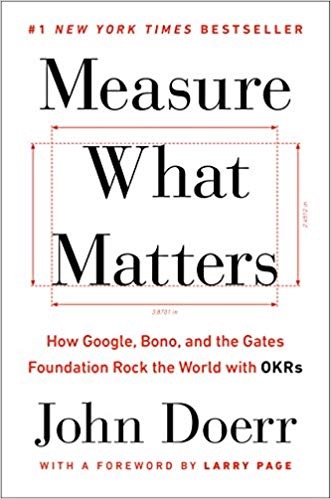I have a confession to make. Two actually.
Few people in Silicon Valley have not heard of the venture capitalist John Doerr. I watched John Doerr’s TED talk some time ago. Then I gave this book Measure What Matters by John Doerr to my best friend, but I ended up reading it first. For some time, I did not realize the John Doerr who gave the TED talk is this John Doerr who wrote the book. Perhaps I should have paid attention or googled his image.
The second confession is, until I began reading the book, I did not know the John Doerr who wrote this book is the same John Doerr as of the venture capitalist of Kleiner Perkins. There were three John Doerrs to me for some brief time. How extraordinary, this must be a good name to have, I thought. That cloud dispersed quickly, but the realization brought me some self-mocking laughter in private. Now I have read this book from cover to cover and have not met John in person, he certainly has my greatest respect, for his clarity and generosity in sharing his wisdom in this book. This same feeling came to me when I saw Winston Churchill’s many paintings. Just when you think you cannot possibly admire someone more, here go more pieces demonstrating his talent and impact.

The book came with a website very appropriately named whatmatters.com. There you can view John’s TED talk and many other resources.
This book focuses on OKR (objectives and key results), with a chapter dedicated to continuous performance management via CFR (Conversation, feedback and recognition). OKR is widely adopted (successfully or not) by the companies in Silicon Valley, at least according to my limited experience. Its concept is familiar to most people around me. It is a popular management framework consisting of a clearly defined objective and a small number of crisp descriptions of progress expected as measured by key results to track the outcome. Crucially, achieving all the key results must lead to meeting the objective. Otherwise, it is leaning the ladder against the wrong wall.
On setting objectives, this book includes a quote from Andy Grove advocating that less is more:
The one thing an OKR system should provide par excellence is focus. This can only happen if we keep the number of objectives small…Each time you make a commitment, you forfeit your chance to commit to something else. This, of course, is an inevitable, inescapable consequence of allocating any finite resource. People who plan have to have the guts, honesty, and discipline to drop projects as well as to initiate them, to shake their heads “no” as well as to smile “yes” … we must realise and act on the realization that if we try to focus on everything, we focus on nothing.
There are many real world use cases in this book. It is full of fascinating stories of what went wrong for some companies at least initially trying to jump into OKR, how they corrected the course over time and what lessons are learned. The book is priced at X. But the stories told and insights distilled in this book are worthy of countless times more, even taking the opportunity cost, and the priceless nature of my leisure time and attention into account.
I think in the form of questions. Naturally, among all the text, I enjoyed the numerous questions in this book most. Many of these questions are raised by the author; many others come from the stories told of past projects in companies like Intel, Google etc. The snippet below shows an example.
In Project Aristotle, an internal Google study of 180 teams, standout performance correlated to affirmative responses to these five questions:
- Structure and clarity: are goals, roles and execution plans on your team clear?
- Psychological safety: can we take risks on this team without feeling insecure or embarrassed?
- Meaning of work: are we working on something that is personally important for each of us?
- Dependability: can we count on each other to do high quality work on time?
- Impact of work: do we fundamentally believe that the work we are doing matters?
One chapter of this book is culture. As an example, it includes two original slides titled Operating Style – Our Value System, outlining Andy Grove’s teachings on Intel’s core culture dated from 1985:
- People oriented
- We value a strong mutual commitment
- Respect for all work
- Challenge and opportunity
- Openness
- Highlighting of problems or issues expected
- Issue resolution
- Clean and crisp
- Confrontation must be constructive
- Results
- Output orientation in all work
- Superficiality not respected
- Reward successes with positive feedback
- Discipline
- Excellence in a highly competitive, complex environment demands it
- Risk taking
- High technology orientation necessitates it
- Low fear of failing, self-exposure
- Champions
- Trust and integrity
There are many many more pearls in this small volume that I shall leave you to discover for yourself. Approaching the end, the book includes extra resources such as Google’s OKR playbook, a typical OKR cycle, and suggestions on performance conversation.
The lines touched me most in this book:
Long before I encountered OKRs, my father and hero, Lou Doerr, taught me the value of focus, commitment, high standards, and higher aspirations (and RMA – the RIght Mental Attitude). My mother, Rosemary Doerr, gave me her unconditional support to put those lessons into practice.
I am grateful that John Doerr and many contributors wrote this book.